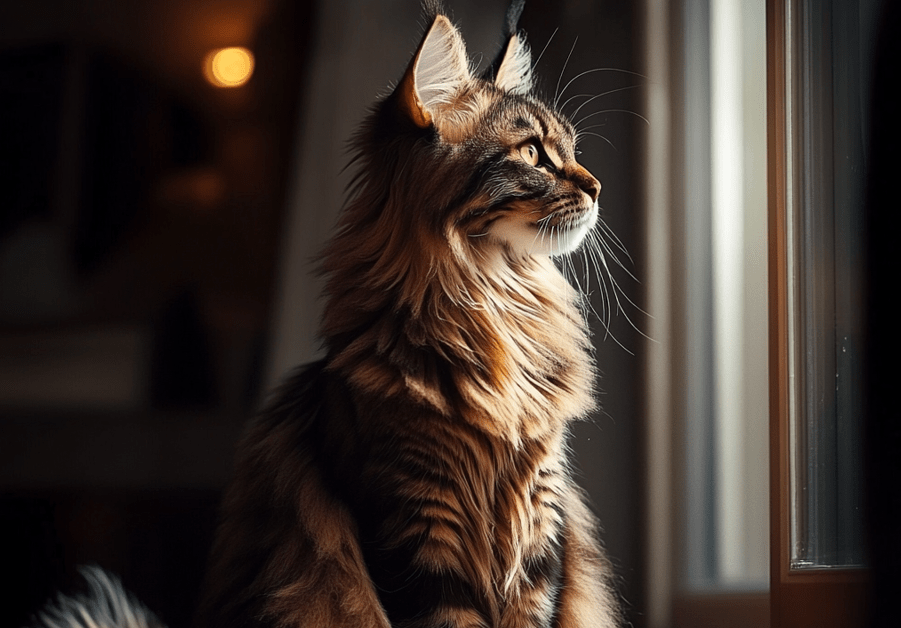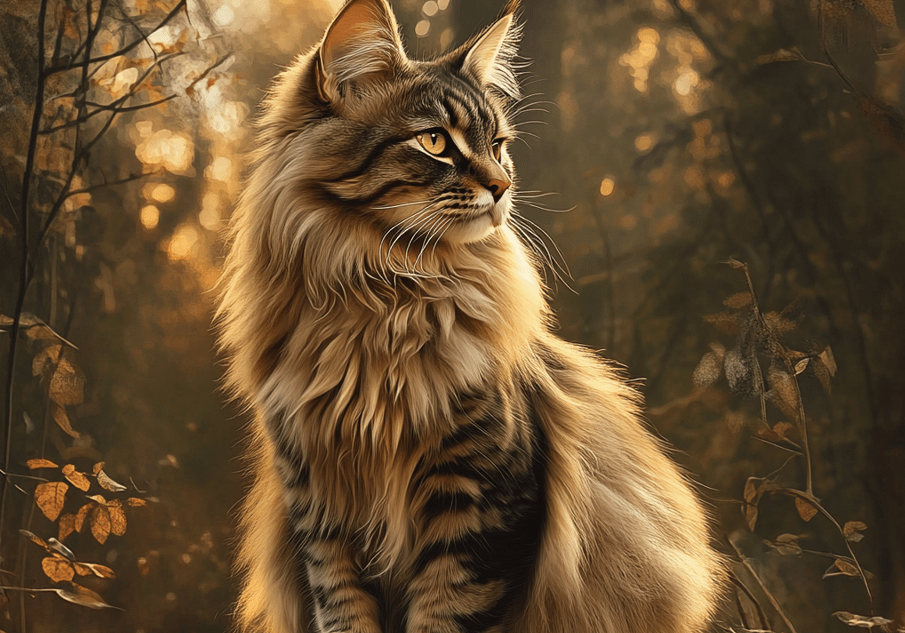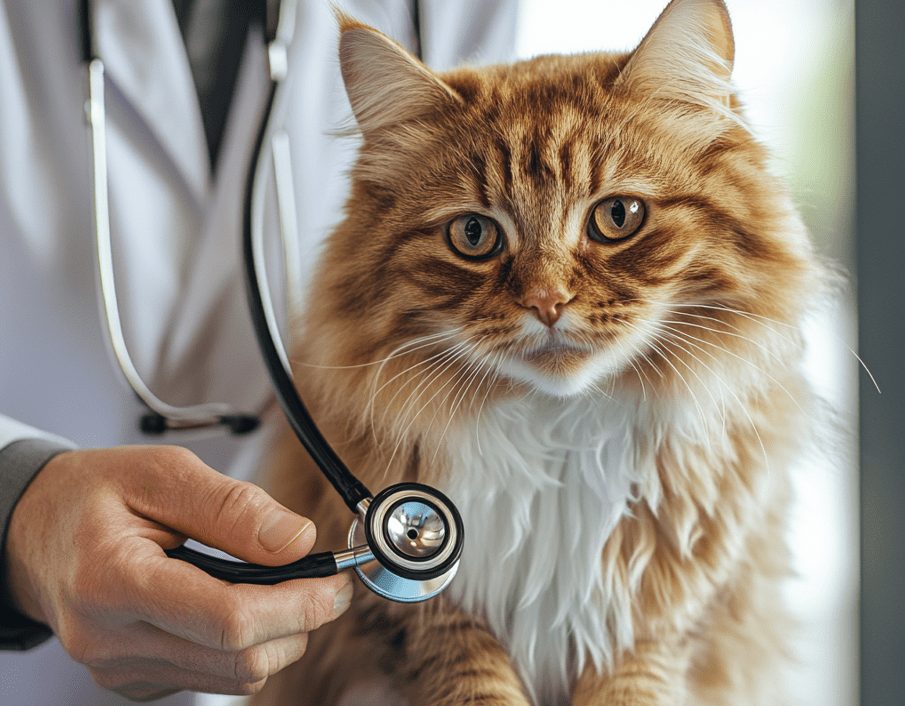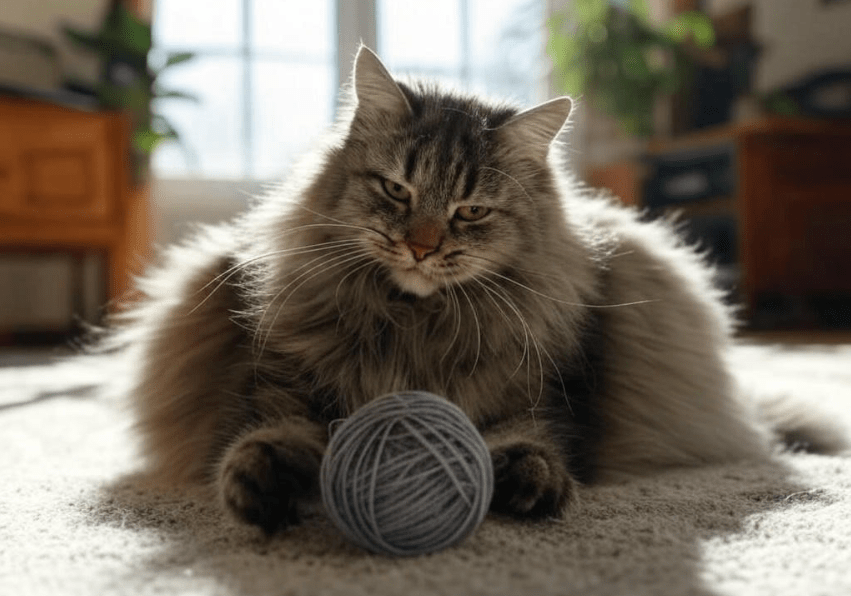
Maine Coon sleeping habits are a fascinating aspect of this beloved breed’s behavior. Known for their large size, tufted ears, and friendly personalities, Maine Coons often captivate owners with their unique sleep patterns. Whether your Maine Coon is sprawled across the couch or tucked into a cozy box, understanding what’s normal and what might signal a problem is key to ensuring their health and happiness. This comprehensive guide explores the typical sleeping behaviors of Maine Coons, factors influencing their rest, and signs that something may be amiss.
Why Maine Coon Sleeping Habits Matter
Maine Coons, like all cats, spend a significant portion of their lives sleeping—typically 12 to 18 hours a day. However, their size, personality, and energy levels give their sleep habits a distinct flair. By understanding their natural rhythms, you can better cater to their needs, create a comfortable environment, and spot potential health or behavioral issues early. This article covers everything from typical sleep patterns to red flags, offering actionable insights for Maine Coon owners.
What Influences Maine Coon Sleeping Habits?
Several factors shape how, when, and where a Maine Coon sleeps:
Age: Kittens and senior Maine Coons sleep more than healthy adults.
Activity level: Maine Coons are playful and active, so their sleep often follows bursts of energy.
Environment: Comfort, temperature, and safety affect sleep quality.
Health: Underlying medical conditions can alter sleep patterns.
Diet and hydration: Proper nutrition supports healthy rest cycles.
Normal Maine Coon Sleeping Habits
Maine Coons exhibit a range of sleep behaviors that reflect their unique traits. Below are the most common patterns considered normal for this breed.
1. Long Sleep Duration
Maine Coons are crepuscular, meaning they’re most active at dawn and dusk. This leads to long periods of rest during the day and night. It’s normal for a Maine Coon to sleep 12-16 hours daily, with kittens and seniors often reaching 18 hours or more.
What’s Normal:
1.Napping in short bursts (catnaps) throughout the day.
2.Deep sleep cycles at night, often in a favorite spot.
3.Adjusting sleep based on activity, with more rest after playtime.
2. Unique Sleeping Positions
Maine Coons are known for their quirky and sometimes comical sleeping positions, thanks to their large, flexible bodies.
Common Positions:
Sprawled out: Lying flat on their back or side, often on cool surfaces like tile or hardwood.
Curled up: Tucked into a tight ball, usually in cozy spots like blankets or baskets.
Loaf pose: Sitting with paws tucked under, resembling a loaf of bread.
Contortionist poses: Stretching into odd angles, such as draped over furniture or hanging off edges.
These positions are normal and reflect their comfort and trust in their environment.
3. Preference for High or Cozy Spots
Maine Coons love elevated perches and snug hideaways, reflecting their instincts as climbers and hunters.
Favorite Sleep Spots:
1.Cat trees, shelves, or window perches for high vantage points.
2.Soft beds, blankets, or cardboard boxes for warmth and security.
3.Near their owners, as Maine Coons are social and enjoy bonding during rest.
4. Social Sleeping
Unlike more aloof breeds, Maine Coons often seek out their owners or other pets for sleep. They may nap on your lap, beside you on the couch, or even in your bed.
What’s Normal:
1.Following you to sleep in shared spaces.
2.Cuddling with other pets, especially in multi-cat households.
3.Vocalizing (chirping or trilling) before settling down, a sign of their chatty nature.
5. Seasonal Sleep Variations
Maine Coons may adjust their sleep habits based on the seasons. Their thick, water-repellent coats make them sensitive to temperature changes.
Seasonal Patterns:
Winter: Seeking warm spots like radiators, heated beds, or sunny windows.
Summer: Favoring cooler surfaces like tile floors or shaded areas.
Shedding seasons (spring/fall): Increased grooming may lead to more rest to conserve energy.
Factors That Affect Maine Coon Sleeping Habits
While many sleep behaviors are normal, certain factors can influence how much or how well your Maine Coon sleeps. Understanding these can help you optimize their rest.
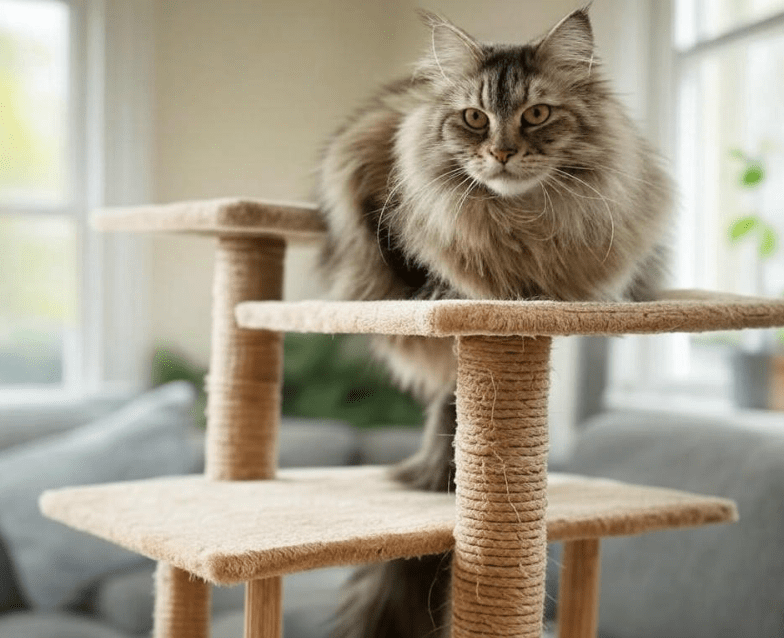
1. Age and Life Stage
Kittens: Sleep more due to rapid growth and high energy expenditure. Expect frequent naps between play sessions.
Adults: Balance sleep and activity, with predictable rest patterns.
Seniors: Sleep longer and may prefer quieter, more accessible spots due to reduced mobility or health issues.
2. Diet and Nutrition
A balanced diet supports healthy sleep cycles. Poor nutrition or irregular feeding can disrupt rest, causing restlessness or lethargy.
Tips for Better Sleep:
1.Feed high-quality, protein-rich food tailored to Maine Coons’ needs.
2.Maintain consistent feeding times to regulate their internal clock.
3.Ensure access to fresh water to prevent dehydration, which can affect energy levels.
3. Environment and Comfort
Maine Coons thrive in safe, comfortable spaces. A stressful or unsuitable environment can lead to poor sleep quality.
How to Optimize:
1.Provide multiple sleep options, such as cat beds, perches, and cozy blankets.
2.Keep sleeping areas clean and free from loud noises or disruptions.
3.Use pheromone diffusers like Feliway to create a calming atmosphere.
4. Activity and Stimulation
Maine Coons are intelligent and active, requiring mental and physical stimulation. Without it, they may sleep excessively out of boredom or become restless at night.
Encourage Healthy Activity:
1.Offer interactive toys like feather wands or laser pointers.
2.Provide climbing structures or puzzle feeders for mental engagement.
3.Dedicate 15-20 minutes twice daily to play, mimicking hunting behaviors.
5. Health and Wellness
Medical conditions can significantly alter sleep patterns. Maine Coons are prone to certain health issues that may affect rest.
Common Health Influences:
Hypertrophic cardiomyopathy (HCM): A heart condition that can cause lethargy or disrupted sleep.
Arthritis: Common in seniors, leading to discomfort and changes in sleep spots.
Hyperthyroidism: May cause restlessness or increased activity at night.
Obesity: Can reduce energy and lead to excessive sleeping.
What’s Not Normal: Red Flags in Maine Coon Sleeping Habits
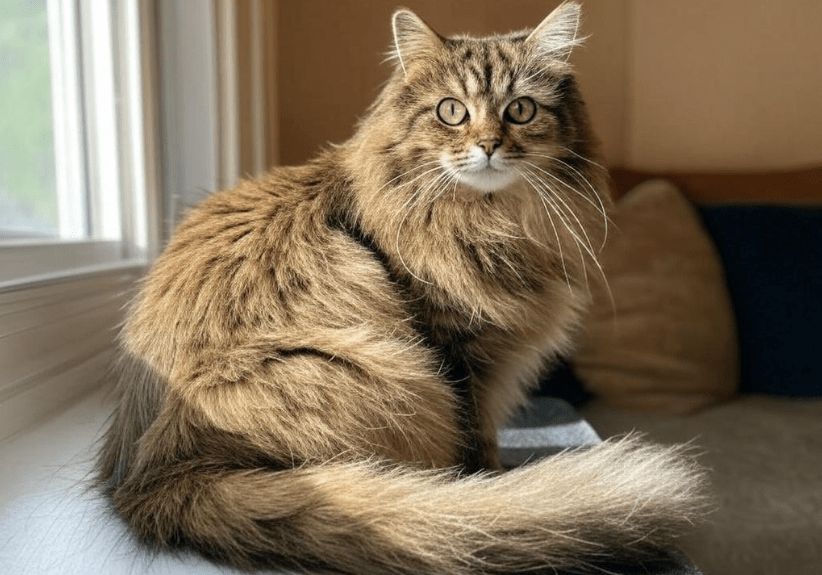
While Maine Coons have varied sleep patterns, certain behaviors may indicate a problem. Monitor for these signs and seek veterinary advice if they persist.
1. Excessive Sleeping or Lethargy
Sleeping more than 18 hours daily, especially in adult Maine Coons, or appearing unusually tired could signal:
1.Nutritional deficiencies.
2.Anemia or infections.
3.Chronic conditions like diabetes or kidney disease.
Action: Schedule a vet visit for bloodwork and a physical exam.
2. Restlessness or Insomnia
If your Maine Coon paces, vocalizes excessively, or can’t settle at night, possible causes include:
1.Stress or environmental changes (e.g., new pets, moving).
2.Pain from dental issues, arthritis, or urinary tract problems.
3.Hyperthyroidism or neurological issues.
Action: Identify recent changes and consult a vet to rule out medical causes.
3. Sudden Changes in Sleep Spots
A Maine Coon abandoning favorite sleep spots or choosing unusual locations (e.g., hiding under furniture) may indicate:
1.Pain or discomfort, such as arthritis or injury.
2.Stress or anxiety from household changes.
3.Temperature sensitivity due to illness (e.g., seeking warmth with a fever).
Action: Monitor for other symptoms and ensure sleep areas remain accessible and comfortable.
4. Irregular Sleep-Wake Cycles
Disrupted patterns, such as sleeping all day and being overly active at night, may stem from:
1.Lack of stimulation or exercise.
2.Inconsistent feeding or routine.
3.Medical issues like hyperthyroidism or cognitive dysfunction in seniors.
Action: Establish a consistent routine and increase daytime activity.
5. Physical Symptoms During Sleep
Watch for these concerning signs during rest:
1.Labored breathing or snoring, which could indicate respiratory issues or HCM.
2.Twitching or seizures, potentially linked to neurological conditions.
3.Vomiting or coughing upon waking, possibly due to hairballs or digestive issues.
Action: Record symptoms (e.g., with a video) and consult a vet immediately.
How to Support Healthy Maine Coon Sleeping Habits
Creating an environment that promotes restful, healthy sleep is essential for your Maine Coon’s well-being. Here are practical tips to optimize their sleep.
1. Provide a Variety of Sleep Spots
Maine Coons love options. Offer a mix of elevated perches, cozy beds, and cool surfaces to suit their mood and the weather.
Ideas:
1.Install window perches for bird-watching naps.
2.Place soft beds in quiet corners or near your workspace for bonding.
3.Use cooling mats in summer and heated beds in winter.
2. Maintain a Consistent Routine
A predictable schedule for feeding, play, and quiet time helps regulate your Maine Coon’s sleep-wake cycle.
Routine Tips:
1.Feed at the same times daily, ideally morning and evening.
2.Schedule play sessions before meals to mimic hunting and rest cycles.
3.Keep bedtime consistent, dimming lights to signal rest.
3. Create a Calm Environment
Minimize stress and disruptions to ensure quality sleep.
How to Do It:
1.Place sleeping areas away from noisy appliances or high-traffic zones.
2.Use white noise machines to drown out sudden sounds.
3.Avoid frequent rearrangements of furniture or sleep spots.
4. Monitor and Adjust for Age
Tailor sleep accommodations to your Maine Coon’s life stage.
Kittens: Provide safe, warm spaces for frequent naps.
Adults: Offer stimulating toys to balance activity and rest.
Seniors: Use low-entry beds or ramps for easy access.
5. Regular Veterinary Care
Routine checkups catch health issues that could disrupt sleep. Maine Coons are prone to genetic conditions like HCM, so annual or biannual vet visits are crucial.
What to Discuss:
1.Weight management to prevent obesity-related sleep issues.
2.Screening for heart or thyroid conditions.
3.Dental health to avoid pain that disturbs rest.
Common Myths About Maine Coon Sleeping Habits
Let’s debunk some misconceptions to clarify what’s normal.
Myth 1: Maine Coons Sleep Less Because They’re Active
Fact: Maine Coons sleep as much as other cats (12-18 hours), but their playful bursts may make them seem more awake.
Myth 2: All Sleeping Positions Are Normal
Fact: While quirky poses are typical, sudden changes or signs of discomfort warrant investigation.
Myth 3: Nighttime Activity Means They’re Not Sleeping Enough
Fact: Maine Coons are naturally crepuscular, so nighttime play is normal unless it’s excessive or disruptive.
Conclusion
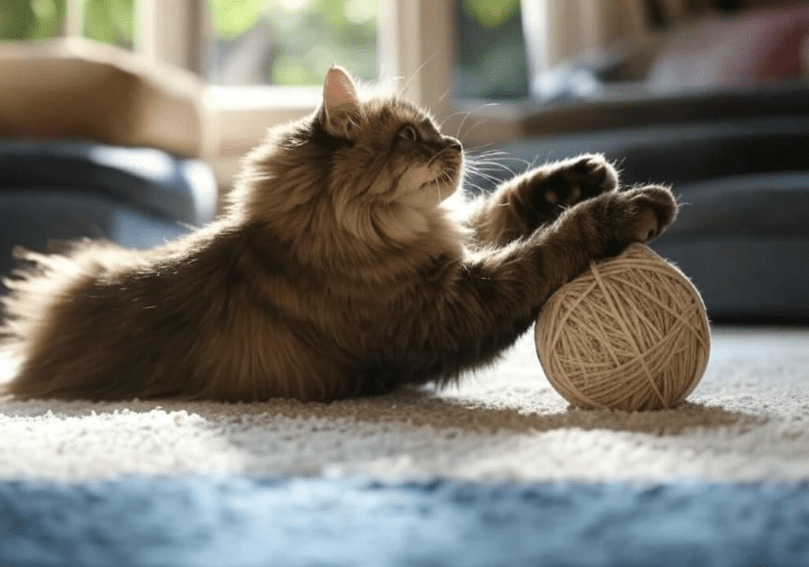
Understanding Maine Coon sleeping habits is key to ensuring your cat’s health and happiness. From their love of sprawling on cool floors to their preference for cozy, elevated perches, Maine Coons display a range of normal sleep behaviors that reflect their unique personalities. By providing a comfortable environment, maintaining a consistent routine, and monitoring for red flags, you can support healthy rest and catch potential issues early. Use the insights and tips in this guide to create a restful, nurturing space for your Maine Coon, helping them thrive as the majestic companions they are.

